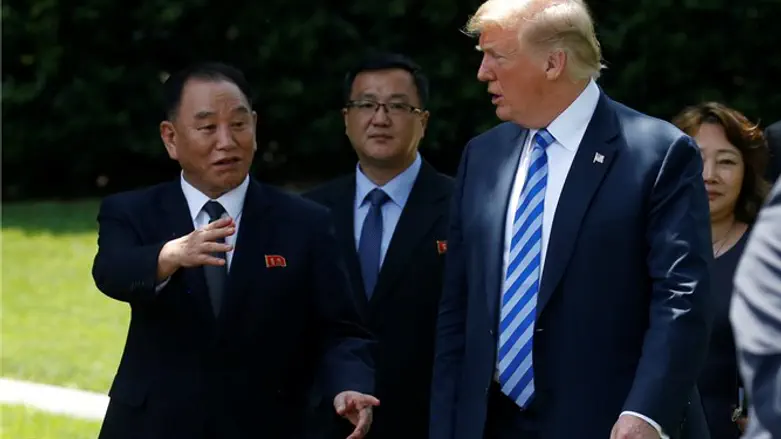
North Korea’s state-run news media announced on June 3 that Syrian President Bashar al-Assad plans to visit North Korean leader Kim Jong-un. Given the active history of North Korea-Syrian relations, it is likely that these two pariah state leaders will have much to discuss. Both have an interest in safeguarding their power and ensuring their personal survival amid these uncertain times. 
Mr. Trump has more than a few cards to play in his upcoming dealings with Kim. During the June 12 summit in Singapore, President Trump should convey to Mr. Kim Washington’s opposition to Pyongyang’s long established relations with both Damascus and Tehran, and how the U.S. is prepared to confront their deadly weapons trade and hostility to U.S. allies in the Middle East.
During the June 12 summit in Singapore, President Trump should convey to Mr. Kim Washington’s opposition to Pyongyang’s long established relations with both Damascus and Tehran, and how the U.S. is prepared to confront their deadly weapons trade and hostility to U.S. allies in the Middle East.
Gone must be the days of uncontested chemical weapons, ballistic missile and nuclear technology transfers between Pyongyang, Damascus and Tehran. It must be communicated to these regimes that the U.S. and its partners are watching closely and that future weapons transactions between them will have consequences.
Tragically, the world has seen firsthand the horrific byproducts of North Korea’s sordid commercial relations with the Middle East, the latest being the April 7 Syrian regime chemical weapons attack against civilians in Douma, Syria.
Mr. Trump has more than a few cards to play in his upcoming dealings with Kim. Kim wants guarantees of his personal safety, continued rule and foreign investment. While President Trump will likely attempt to use these carrots to achieve denuclearization, he would also do well to use them as leverage to defang North Korea-Middle East security ties.
A visit by Mr. Assad to North Korea would mark the first time that Mr. Kim has welcomed a head of state in his country. However, it would hardly be the first time that Syria and North Korea have embraced and collaborated.
Pyongyang and Damascus have a history of warm relations. North Korea provided Syria with fighter aircraft pilots and troops during the Arab-Israeli Wars of the 1960s and 1970s, supplied Damascus with ballistic missiles and helped develop a nuclear facility in Syria that Israel destroyed with airstrikes in 2007.
More recently, a United Nations report from earlier this year documented North Korean shipments of chemical weapons production supplies as well as ballistic missile, conventional arms and dual use items to Syria over the course of 2012-2017.
It has also been reported that North Korean weapons advisors have been operating out of missile and chemical weapons sites inside Syria, lending their expertise to the Syrian regime. Some reports indicate that North Korean scientists may still be operating in Hama, Barzeh and Adra.
On two separate occasions, Mr. Trump has rightly led missile strikes in Syria in response to the Assad regime’s chemical weapons attacks against civilians. Since Syria’s chemical weapons program was built with the assistance of North Korea, Washington must move to cut off one of the principal enablers of Assad’s horrendous war crimes.
As part of his upcoming denuclearization summit with Kim, Mr. Trump should demand the end of North Korea’s export of chemical, biological and conventional arms to Syria and Iran in exchange for partial relief of economic sanctions.
Such measures would help obstruct Assad’s ability to conduct further chemical and biological weapons attacks on opposition forces and Syrian civilians. It would also save lives in the broader Middle East. Denying both Syria and Iran of the flow of arms from Pyongyang is a step towards safeguarding U.S. regional partnerswho are also targets of Syrian and Iranian aggression, i.e., Israel and Sunni Arab Gulf states. It would also help protect U.S. troops currently on the ground in Syria and Iraq.
Stopping Assad’s ability to use poison gas will also support the principle that chemical weapons cannot be accepted as a tool of warfare. It will also send a signal that the use of chlorine gas, despite not constituting a banned weapon under international law, must not be tolerated.
Mr. Kim and Mr. Assad have their reasons to meet. Kim needs Assad’s hard currency and Assad wants chemical weapons and other arms to ensure his survival in the Syrian civil war and afterwards. Both men likely find solidarity with one another as they share common backgrounds of inheriting their power, heading up criminal regimes and seeking weapons of mass destruction while defying the international system. It may also be Kim is communicating that he has options outside of his regime’s traditional patrons of Beijing and Moscow.
Yet, the June 3 announcement of Assad’s visit to North Korea presents a well-timed opportunity for President Trump to address with Mr. Kim his regime’s problematic relations with Damascus and Tehran. The upcoming denuclearization summit must devote the necessary time for disrupting this lucrative and murderous weapons trade that that has played its part in war crimes and contributed to regional destabilization for decades.
Dr. Ted Gover is the Associate Director of the Tribal Administration Program at Claremont Graduate University.